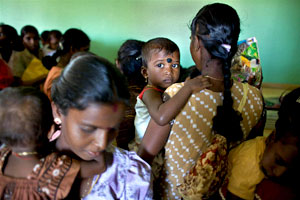Ilankai Tamil Sangam30th Year on the Web Association of Tamils of Sri Lanka in the USA |
||||||||||||||||||||
 Home Home Archives Archives |
UNICEF Humanitarian Action Report 2010
Critical Issues for Children and Women In 2009, the military phase of the 26-year armed conflict between the Liberation Tigers of Tamil Eelam and the Sri Lankan Government ended. However, during 20009 alone, the conflict displaced over 280,000 people, almost as many as the estimated 300,000 displaced during the entire course of the protracted conflict. As of December 2009, one third of the newly affected population remain in camps, while two thirds have been able to return to their districts of origin. Returnees face an uncertain future, given that many of the areas of return are heavily contaminated by landmines and offer little in the way of infrastructure or basic social services. Both groups will be almost entirely dependent on humanitarian assistance for at least the next 6–12 months. Urgent support is required both to facilitate the resettlement of the internally displaced children and their families and to ensure basic services for those remaining in camps. Planned Humanitarian Action for 2010 In 2010, UNICEF and partners will not only support the resettlement process in the Northern and Eastern Provinces of Sri Lanka through the provision of emergency relief operations benefiting both returnees and host communities, but will also continue to provide basic services to those remaining in camps. Following are the expected results of UNICEF’s emergency interventions: Health: In cooperation with the Government and cluster partners, basic health-care services will be established in poorly served areas; these will take the form of outreach mobile clinics equipped to deliver essential drugs, routine and catch-up immunization and micronutrient supplements. Damaged health centres in conflict-affected areas will be refurbished to deliver basic maternal and paediatric care. Nutrition: The UNICEF-led Nutrition Cluster in cooperation with the Government will strengthen nutrition surveillance to monitor the nutritional status of conflict-affected children under five and support an integrated package of nutrition interventions for community based management of acute malnutrition. Water, Sanitation and Hygiene (WASH): UNICEF and partners will ensure sufficient safe water supply and sanitation as per Sphere standards for up to 280,000 conflict-affected persons in camps and areas of return, through the construction and rehabilitation of water supply systems and sanitary facilities, including those in schools and health centres. Better hygiene practices will be encouraged through hygiene promotion activities and distribution of hygiene kits in return communities, schools and camps. Education: UNICEF will concentrate its efforts on providing access to a safe and secure education environment for approximately 90,000 children in the returnee areas who have missed out on education due to the conflict and ensuing displacement. Children will benefit directly from the creation of temporary learning spaces, the refurbishment of damaged schools and the provision of learning materials, and indirectly from teacher training in psychosocial support, integration strategies, and alternative education methodologies. Child Protection: Children affected by the conflict will be provided with psychosocial support through the establishment of child-friendly spaces and strengthened community-based protection systems. Support will be provided to all vulnerable children, but especially those separated from their families or orphaned by the conflict. In cooperation with partners, an estimated 570 children previously associated with armed groups will be assisted through psychosocial, education and reintegration activities. Mine-risk education will be provided to all returnees to minimize their risk of injury from mines and other unexploded devices.
|
|||||||||||||||||||
|
||||||||||||||||||||
